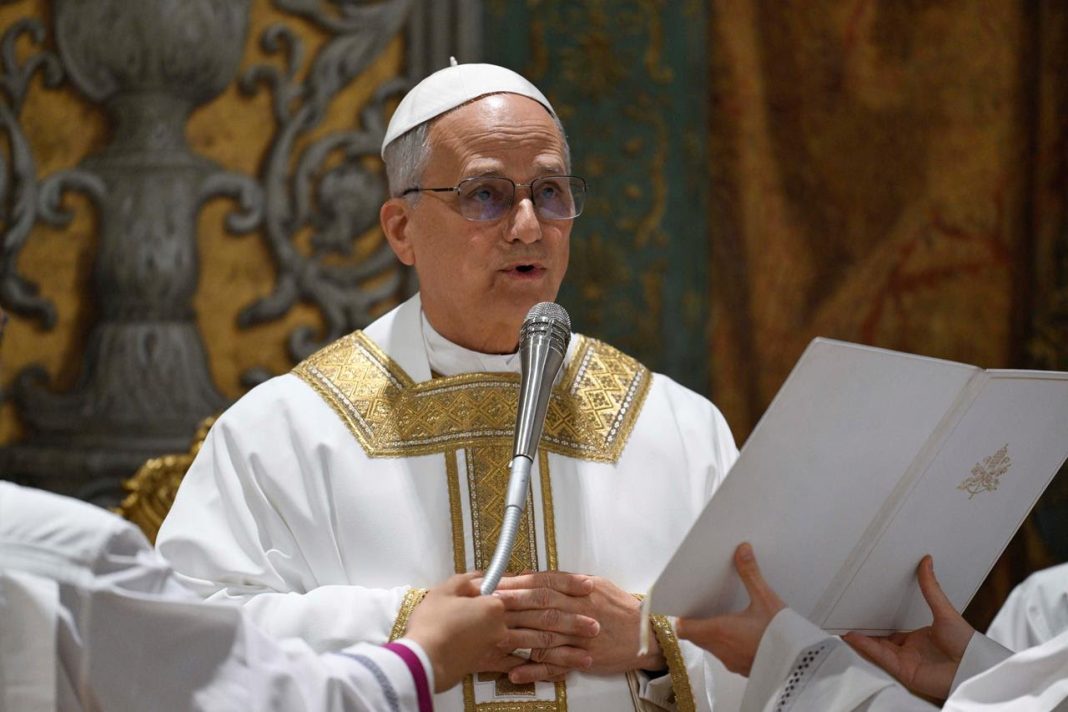VATICAN CITY – Pope Leo XIV, the first U.S.-born pontiff in the history of the Roman Catholic Church, described his election as both “a cross and a blessing” during his first Mass as pope on Friday, May 9, 2025.
Speaking in the Sistine Chapel, where cardinals elected him a day earlier, the 69-year-old former missionary and Vatican official set a tone of humility, unity, and global evangelism in his inaugural homily.
Celebrating the Mass in the frescoed sanctuary under Michelangelo’s iconic ceiling, the Chicago-born Robert Prevost — now Pope Leo XIV — addressed the College of Cardinals in English, speaking extemporaneously and with notable emotion.
“You have called me to carry that cross and to be blessed with that mission,” he said.
“And I know I can rely on each and every one of you to walk with me as we continue as a church, as a community, as friends of Jesus, as believers, to announce the good news, to announce the Gospel.”
A Break from Tradition
Leo XIV’s election on Thursday marked a historic departure from centuries of precedent, breaking through an informal tradition that no pope should come from the world’s dominant superpower.
Born in Chicago’s Bronzeville neighbourhood in 1955 and raised in nearby Dolton, Leo was widely known in the Vatican for his administrative leadership and pastoral sensitivity.
Brought to Rome in 2023 by Pope Francis, he served as Prefect of the Dicastery for Bishops, one of the most powerful positions in the Curia, responsible for overseeing the global appointment of bishops — a key tool in shaping the Church’s future.
Continuity with Francis’ Legacy
Friday’s Mass offered early indications that Pope Leo intends to build on the legacy of Pope Francis, especially in the area of social justice and inclusion.
Notably, two women read Scripture during the liturgy — a symbolic gesture that aligns with Francis’ longstanding efforts to elevate the role of women in Church life.
In his homily, Pope Leo addressed the challenges of contemporary evangelism, lamenting that Christianity is often misunderstood or dismissed in many parts of the world.
“Some see Jesus as a kind of charismatic leader or superman,” he said, “but miss the joy of the Gospel — the hope that comes with knowing Him.”
Deep Roots in the Americas
Pope Leo’s transcontinental experience bridges both North and South America.
He served for decades as an Augustinian missionary in Peru, where he is remembered for his compassionate leadership during the COVID-19 crisis.
As bishop of Chiclayo, he spearheaded the local Church’s purchase of oxygen production plants at the height of the pandemic, saving countless lives.
In contrast, he drew attention during his Vatican tenure for occasional critiques of U.S. political leadership, including social media posts critical of former President Donald Trump’s administration — a rare public stance among senior clerics.
A Humble Start
Friday’s Mass was intimate but symbolic.
While the full grandeur of a papal inauguration Mass is expected in the coming days, this liturgy was a moment for the new pope to speak plainly to his electors and to signal the spiritual posture of his pontificate.
With a name evoking the courage of Pope Leo I (Leo the Great) and the reforming spirit of Leo XIII, Pope Leo XIV steps into the role at a time of both challenge and opportunity for the global Church.
In a world marked by conflict, secularism, and deep inequality, his words echoed the call to serve faithfully.
“As friends of Jesus,” he reminded the cardinals, “we go forth — together.”







